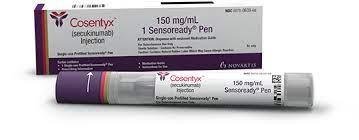Cosentyx Disease Interactions
There are 3 disease interactions with Cosentyx (secukinumab).
Secukinumab (applies to Cosentyx) infections
Moderate Potential Hazard, Moderate plausibility. Applicable conditions: Infection - Bacterial/Fungal/Protozoal/Viral
Secukinumab may increase the risk of infections. There have been postmarketing reports of serious bacterial, viral, and fungal opportunistic infections; some fatal infections have been reported in patients receiving secukinumab. Cases of hepatitis B reactivation have been reported. Caution is recommended when considering the use of secukinumab in patients with a chronic infection or history of recurrent infection. A hepatitis specialist should be consulted if signs of hepatitis B virus reactivation occur; secukinumab is not recommended for use in patients with active viral hepatitis.
Secukinumab (applies to Cosentyx) inflammatory bowel disease
Moderate Potential Hazard, Moderate plausibility.
New onset and exacerbations of inflammatory bowel disease (IBD), in some cases serious, have been reported in patients treated with secukinumab. Caution should be used when prescribing secukinumab to patients with IBD. Patients treated with secukinumab should be monitored for signs/symptoms of IBD.
Secukinumab (applies to Cosentyx) tuberculosis
Moderate Potential Hazard, Moderate plausibility. Applicable conditions: Tuberculosis -- Active, Tuberculosis -- Latent, History - Tuberculosis
There have been postmarketing reports of active tuberculosis (TB) developing in patients with history of latent TB who were treated with secukinumab. Before starting treatment with secukinumab, patients should be evaluated for active or latent TB infection. Administration of secukinumab should be avoided in patients with active TB infection. Treatment of latent TB should be started before using secukinumab. Anti-TB therapy should be considered prior to starting secukinumab in patients with history of latent or active TB in whom an adequate course of treatment cannot be confirmed. Patients should be monitored closely for signs/symptoms of active TB during and after therapy.
Switch to professional interaction data
Cosentyx drug interactions
There are 254 drug interactions with Cosentyx (secukinumab).
More about Cosentyx (secukinumab)
- Cosentyx consumer information
- Check interactions
- Compare alternatives
- Pricing & coupons
- Reviews (260)
- Drug images
- Side effects
- Dosage information
- Patient tips
- During pregnancy
- Support group
- FDA approval history
- Drug class: interleukin inhibitors
- Breastfeeding
- En español
Related treatment guides
Drug Interaction Classification
| Highly clinically significant. Avoid combinations; the risk of the interaction outweighs the benefit. | |
| Moderately clinically significant. Usually avoid combinations; use it only under special circumstances. | |
| Minimally clinically significant. Minimize risk; assess risk and consider an alternative drug, take steps to circumvent the interaction risk and/or institute a monitoring plan. | |
| No interaction information available. |
See also:
Further information
Always consult your healthcare provider to ensure the information displayed on this page applies to your personal circumstances.


